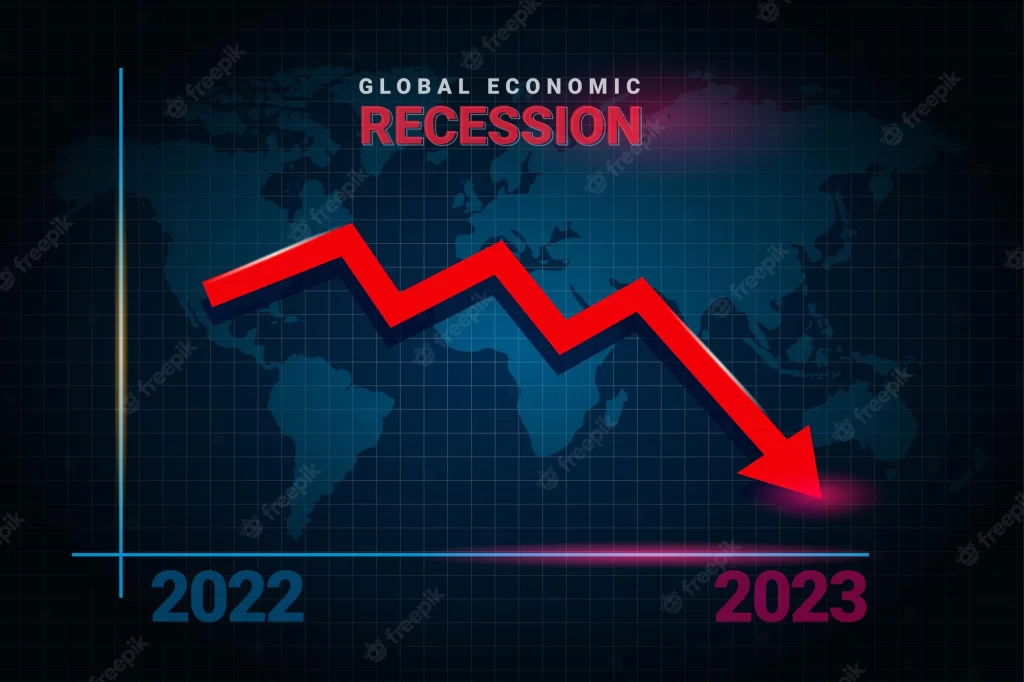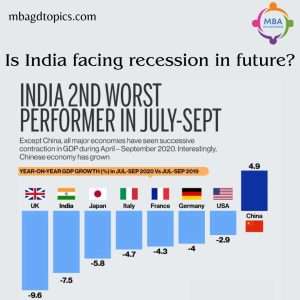Theme:
It is expected that the world will slip into recession in 2023. Several countries are already on the brink of recession. For example, UK GDP contracted and Bank of America’s strategists said the US could fall into a recession in the first quarter of 2023.
According to its survey, it was found that 91% of CEOs of top companies expect a recession in 2023.

What is a Recession ?
Recession can be defined as extended periods of production decline that affect a large portion of the economy.
Recessions often start when a significant decline in consumer expenditure across an economy occurs. When not managed carefully and promptly, it may often be catastrophic for an economy since it may result in an economic depression.
The present situation:
- The world is experiencing an energy shortage as countries in Europe are struggling to provide gas and electricity to their citizens for them to stay warm this winter. Crude oil prices reached a 5-year high of $121 per barrel in June 2022 and are expected to stay at $110 per barrel in 2023.
- Inflation in the year 2022 in almost every major country has reached a new high. In October UK’s inflation reached 41 years high of 11.1 per cent. Inflation in Eurozone reached 10.4 per cent. Inflation in the USA reached 9.1 per cent. India experienced an inflation rate of 6.89%, which is above the RBI’s inflation target of 4%. Many economists predict that 2023 will also see strong inflation rates.
- Job losses in developing countries are on the rise, with many small businesses and start-ups closing down due to low or zero demand in the international market and a trend of protectionist policies implemented by many countries. We are also witnessing big companies like Meta, Amazon, and Microsoft cut a huge number of jobs.
Cause of the present situation:

- The Russia-Ukraine war is going on for 10 months now and it has had devastating effects on the world economy. Due to severe damage to its major cities and infrastructure, Ukraine is cut off from the rest of the world and Russia is penalised with harsh sanctions to keep it out of the global economy.
- Ukraine was the 4th largest producer of wheat, accounting for nearly 30% of the global wheat trade. Russia was also a major player in the oil export market and a member of OPEC+. There is a global shortage of food and energy as a result of this war. This left the global economy in turmoil because the world is still dealing with the COVID pandemic. Hence several countries are facing high inflation.
- The US Federal Reserve is constantly increasing its interest rates to curb high inflation in its economy. As a result, the value of the Dollar is rising, making it more expensive for other nations to trade on the international market.
- The strict COVID restriction protocol of China has discouraged as well as disrupted many companies which are manufacturing there. This has caused even more disturbance in the global supply chain.
- Climate disasters have also caused significant losses to many countries during these hard times.
Impact of a possible recession on the world:
- Many poor countries may suffer from hunger and possible famine due to the rich countries diverting most of the resources like food, energy and capital to meet the needs of their own country.
- A huge number of job losses and an increase in the unemployment rate in many countries.
- High levels of external debt for countries.
- Many people all over the world will be pushed towards poverty due to job losses and the increased cost of living.
India’s situation:
- There is a meagre chance that India will experience a recession. India can fulfil its demand for crude oil from Russia which, due to being cut out from the rest of the world, is providing crude oil at a lower price to a few other countries including India.
- If the USA comes under recession, it will bring down the crude oil prices in the market, which will benefit India. But there remains a risk of capital outflow (assets flowing out of the country) from India that can cause some harm.
- Like many other countries, India’s export sector may face losses because of weak global demand. For example, auto parts makers expect export growth to be muted due to the recessionary environment in US and Europe.

Conclusion:
Recession is a natural phenomenon in the economic cycle where the demand reaches a peak and starts to decline. Recessions have plenty of negative consequences, but with proactive measures from the government, their effects can be reduced and made into a mild recession to prevent severe negative outcomes. Many major countries will likely experience a recession in 2023.
Also Read: India’s E-commerce Policy – Impact on the E-commerce Industry
What’s your take on the recession? Express your point of view through the comment section below. And subscribe to our blog to read answers to the trending GD topics.

